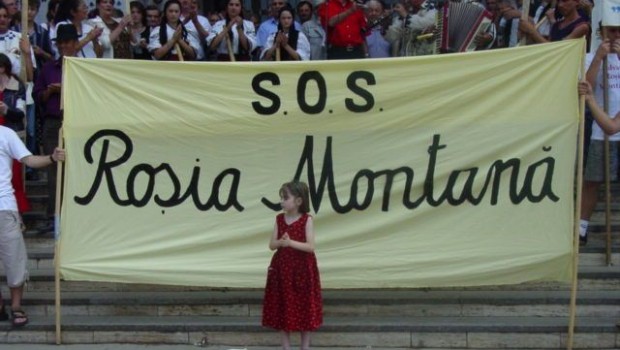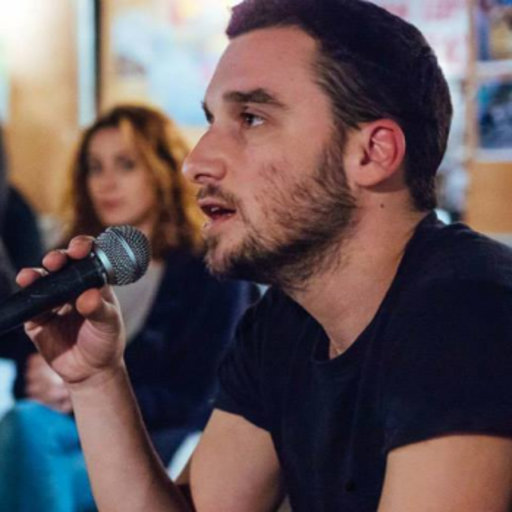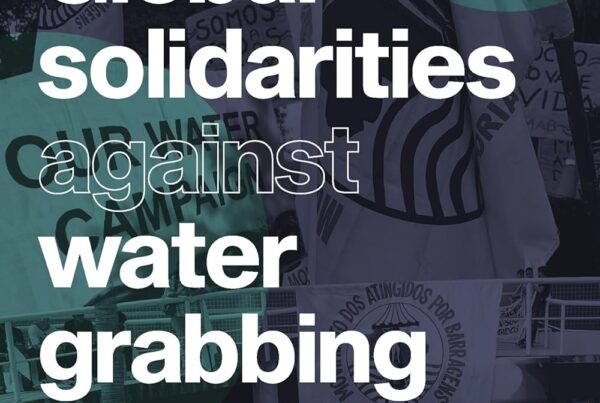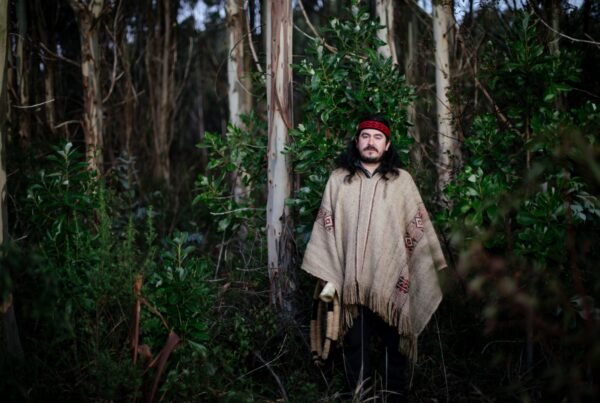by Giorgos Velegrakis
This is interview was originally given for the environmental Magazine Oikotrives in Greece and was translated and published in English and Spanish by the open journal xpressed.

In the areaof Rosia Montanain Romania the residents have been putting up a fight for the past 14 years against the gold mining plans of the Canadian company Gabriel Resources. The major demonstrations in post-communist Romania took place in the last three months, with thousands of people on the streets of major cities supporting the struggle of the residents of Rosia Montana. After the strong pressure of the movement, the respondent committee of the Romanian parliament initially (November 2013) rejected the draft law for the creation of the gold mine. The issue, ofcourse, is not closed as the company is pushing to bring the matter before the House of Assembly.
For that matter, but also for the common questions with the anti-mining movements around the world (and in Chalkidiki) we talked with the Romanian activist, academician, and political ecology researcher (member of the pan-European network ENTITLE) at the Autonomous University of Barcelona, Irina Velicu, who is studying the issue for the past six years.
Giorgos Velegrakis (G.V.): On the 1st of September thousands of Romanians demonstrated against the government’s support for a plan to open Europe’s biggest open-cast gold mine in the small Carpathian town of Rosia Montana. Could you describe us the situation? What is the exact extractive plan and what are the people’s demands?
Irina Velicu (I.V.): Actually after many days of protests the number of people in the streets reached around 20 000 which is without precedent in the post-communist Romania. We did not have so many people in the streets since the revolution in 89. Many articles are written about the plans of the Gold Corporation (of Gabriel Recources): 300 tones of gold and other metals, 15 years of open cast cyanide exploitation, few hundred jobs …or maybe thousands? these numbers always change so there is no credibility besides the fancy commercials that the Corporation is making, spending thousands of euros for buying ‘time and space’ for selling dreams about progress; it was a strong campaign on the part of the corporation ans as Rosienii say, the corporation managed to manipulate many people to sell their land and/or their soul). Now the corporation threatens the government with court action: if the project is not approved, they want to be compensated for their loss. It is such a joke: they made money in speculations, they bribed so many politicians and professionals to promote their joke and now they want more money from compensation…while the area was blocked as mono-industrial by the urbanistic plan for a decade, no other economic plan being allowed. Many people are asking: show us the receipts of your ‘’investments’ so far! Receipts from bribing?
My interest is more in the protests which are the result of 14 years of insistent and diversified struggle of some Rosieni (locals of Rosia Montana) who have asked for the support of certain socio-environmental activists from Romania and abroad. It is important to realise that without the persistent work of these people these protests would not have been possible. This is my belief: what seems to be a spontaneous mobilization is the result of 14 years of struggle of a nucleus of people who had the courage to show that this project mirrors an entire chain of corrupt practices that are happening not only in Romania but more importantly, globally, as part of the practices of capitalist economy which endangers life all over the world. It is also important to remember this structural component of the problem, because nowadays in Romania some people insist on showing that the protest is not about ecology or about structural inequalities but merely about a corrupt government. I think that the amazing mobilization is also due to increasing understanding of the big picture, the fact that Rosia is not merely an isolated case of corruption that can be treated merely with more elections. Some radical questions have to be answered.
G.V.: Could you describe us a little more about the state’s practices to support the extractive-plans in the area? How does it built its social alliances. What are the connections with the private investors (Canada’s Gabriel Resources Ltd)?
I.V.: It is important to know that at the end of the 90s when this corporation (BTW: run by a Romanian Trank Timis who moved to Canada long time ago) announced the project many people were interested in the investment because of jobs. It is also important to remember that in the 90s, the area was officially declared mono-industrial (the Liberal party with Tariceanu as Minister) and hence the urbanistic Plan did not allow for any other investment or business to be opened here. So many people also accuse the corporation that they contributed to the destitution and impoverishment. Local were saying that even if they wanted to make their own business, they would not have been allowed. The corporation basically froze any activity accusing the opponents for keeping the ‘locals in poverty’; but in the same time, the corporation was making money in the stock market and thousands of hundreds of euros on ‘buying consent’ of televisions (with advertising) and buying ‘specialists’ of all kinds to show how great and necessary their mine is. Many people become discouraged and disillusioned. Alburnus Maior sued the Urbanistic plan few times and showed the illegality; but repetitively the local administration is re-making the plans in favour of the corporation. The government has been silent for many years as locals say, refused to address this issue.
Politicians made things possible for the corporation irrespective of ideological affiliation: people are now even more angry because the 2012 Winter protests were also about changing corrupt practices but they were hijacked by the pro-Social-Democrats promising some changes.
These changes never came. On the contrary, this government is truly perverse: it masks as democratic what could actually because a catastrophe. Ponta wants for the Parliament to vote on a special law of Mining that would basically give green light to mining as ‘’national utility’’. Of course one can say it is fair, who else should vote since the Parliament represents the people? And here is where we get stuck with this phony representative democracy that we have (not only in Romania but generally). If it is so clear for many of us that MPs will vote for the corporation (and it is not even about bribe here, some politicians really believe that there is ‘’no alternative’’ of development….which is even more dangerous I think), what is the way out of this blockage? Permanent rebellions, protests…weeks and weeks of people making time for demonstrations…like Bulgaria…like Turkey…
G.V.: On the contrary what are the movement’s social alliances? How did you manage to build a nationwide support to your struggle which led to the demonstrations on the 1st of September?
I.V.: In 2002, 300 families created the local organization called Alburnus Maior and this has gradually gained the support of many other activists all over the world: from Greenpeace and Mining Watch to the EU parliament or even the World Bank. The demonstrations in the last month are a wonderful, amazing, fortunate materialization of 14 years of mostly mouth to mouth and internet campaign of dedicated people as I mentioned before. Of course now it does not really matter … since it is so clear that so many people are against the mine that not even the ‘corrupt’ media channels cannot avoid the topic. Of course, most important TV stations are still reporting as if these protests are some few hundred hippies or young mothers….it is a lot of manipulation and hypocrisy on the part of many so-called ‘opinion-makers’, journalists etc. It is important that the recent message of Alburnus Maior is that the movement ‘does not have leaders’; despite the visible informal leadership of people like Eugen or others, the message is not only about avoiding negotiation with corrupt politicians – the major request is clear and there is no negotiation: ban cyanide mining! – but also about proving that the movement is not about ‘reprezenting’ , taking profit of some by others, etc. In this dirty corporate campaign, many bad things have been said about the activists in an attempt to discredit and inhibit the fundamental radical systemic criticism coming from such people.
G.V.: We know that in Rosia Montana there is a very strong movement against the “under-development” of the area and the deterioration of people’s life and the environment led by the gold-extraction project. How does the movement deal with the question “job and development versus the protection of the environment and people’s quality of life?” What are your views for the development of the area?
I.V.: People also gradually realised that the number of promised jobs is exaggerated and that generally the corporation’s investments in the area are phony …the few people that currently work for the corporation (doing diverse administrative jobs) are supporting the corporation because they are afraid of losing the jobs. Currently, the majority of the locals are already gone, sold their properties and land; out of 800 families, only 100 are still living in Rosia Montana. But as Eugen David, the president of Alburnus Maior says, Rosia Montana is gradually inhabited by new people who love it and want to protect it; thousands of activists and citizens from all over Romania and other countries are coming to Rosia for various reasons every year; tourism, for the many activities that happen there now as the Hay-Fest, new architectural restorations, seminars and various fares.
The current protests in the cities of Romania have been welcomed by Alburnus Maior and Eugen David declared the protesters ‘citizens of Rosia Montana’. It is symbolically amazing because in 2007 when I first visited, the feeling within the community was much for gloomy, people there thought that they are alone and that the few activists (even hundreds) are not enough to stir change against such corporate pressure.
But now, more and more people realise that this corporation should not be given more importance than it deserves, as a mockery through which some corrupt politicians and business men are making money. People shout in the streets now: “The corporation should not make legislation!” and this is a central message of these protests. No matter how much some commentators want to simplify the protests, this campaign for Rosia Montana that has been constructed by few radical activists is still radical because it questions the entire system as it was built after the Fall of communism: as a partnership between business and corrupt politicians, as a defiance to all the ideals of democracy and eventually as an imitation to many of the practices of market economy at the global level. Protesters are against the system that privileges business and profit over people and do not believe anymore that profit is necessarily distributed to those who are in need.
It is so obvious that tyranny has now been distributed to some elites and that behind the appearance of material abundance of our society (compared to communism), we are getting impoverished at a more profound level, on the long term….it is no surprised that another repetitive slogan is ‘We don’t want to be slaves’. There is a clear need of radical new ideas, new practices and new people …this generation has to produce something else this new level of consciousness it has will not allow it to live comfortably numb in the lies of representative democracy.
Rosia, as many other places in Romania, has tourist potential but this is not just about tourism other industry. This is about a major question that the government should ask itself: what kind of economy do we want for Romania? In the last few days I hear Ponta (the PM) saying he wants open cast mining and shale gas and other extractive industries because this is Romania’s future for development. But he forgot that Romanians do not necessarily want this form of development. Ponta is proud of him for opening the public debate about such projects; but he doesn’t seem to care about the real perils of such extractive industries and the phony corporations that come here and promise honey and milk.
In the end, we are reminded that just as what happens in Latin America for instance, development ends up being produced separately from what people want merely because a minority of elite people/nations isolate themselves in cocoons of privilege and wealth. The big picture would tell them that the majority of this planet’s population is vulnerable to such destructive practices despite the economic profits; the majority are the first to be hit by these mining projects. But there is a lot indifference and arrogance on the part of the ruling elites who look in disgust at the small farmers, peasants or workers (what they generally call ‘the poor’ because of their lack of money). I remember a sad episode few days ago: Eugen David was visited by some politicians who (supposedly) wanted to find out more about the movement. The first question one of them asked was: “Didn’t you know we are coming? Why aren’t you dressed and showered properly?” What an arrogance…what a jerk ….to not appreciate the magic of these peasants running from their cows and household to the protests in order for our children to still enjoy the view of the Apuseni mountain, those mountains were children go on holidays.
G.V.: Finally, you know that in Halkidiki, Greece people are giving a very similar fight against the fold-extraction plans in the area? Do you think there is a need for solidarity and support between the anti-extractive movements worldwide? How can this be built?
I.V.: Absolutely… I think this is already happening to a certain extent but it is not enough for this to be among activists. I think the first thing to do is to communicate publicly and in a language of common use. I admire the effort of activists in Rosia because they always tried to translate in English all their press releases, their articles on the website etc. and constantly inform larger audiences. There is no such thing for Krumovgrad in Bulgaria. Is these such a bilingual website for Halkidiki? I was surprised to hear about one of my friend visiting Halkidiki for holiday and not hearing about the dangers. I think a strong campaign of information has to be made at more levels by many NGOs/activits/researchers/artists/intellectuals/professional/ politicians. I think there should not be one or two people but hundreds of people producing and disseminating information on what is happening. I remember a good type of transnational protest was when many activists for Rosia Montana went to Allianz in Germany dressed in death people and protested to convince the company not to support the Gold Corporation…and they did it! Those activists told me that it would have been good if more than one group/country was there…if Bulgarian and Greek activists would have joined….so I think more transnational coordination of action would be necessary because it is obvious that the threats are transnational.






One Comment